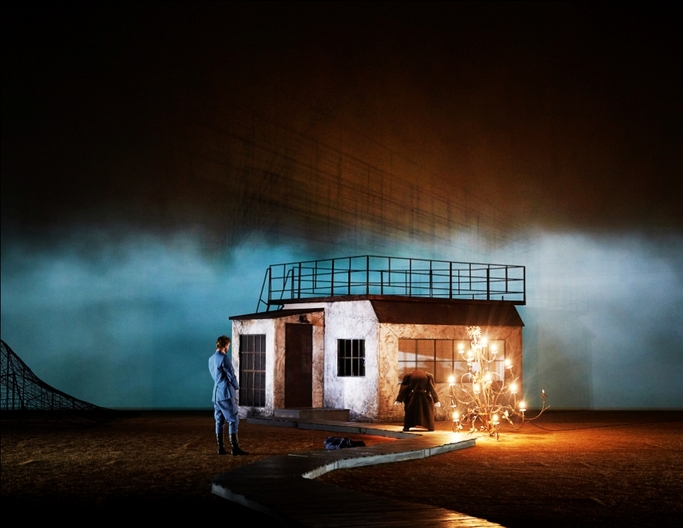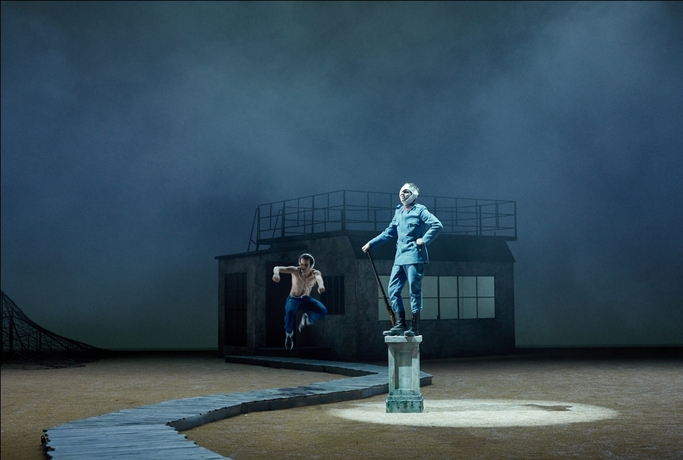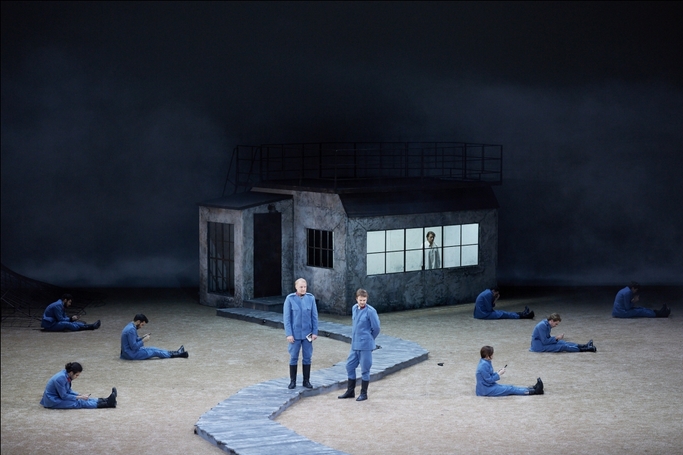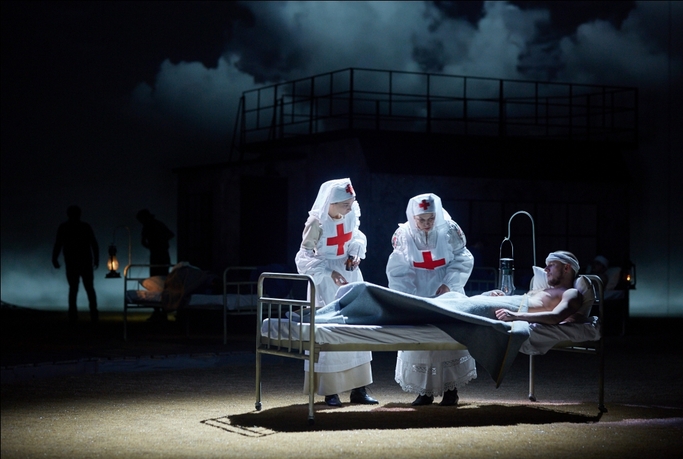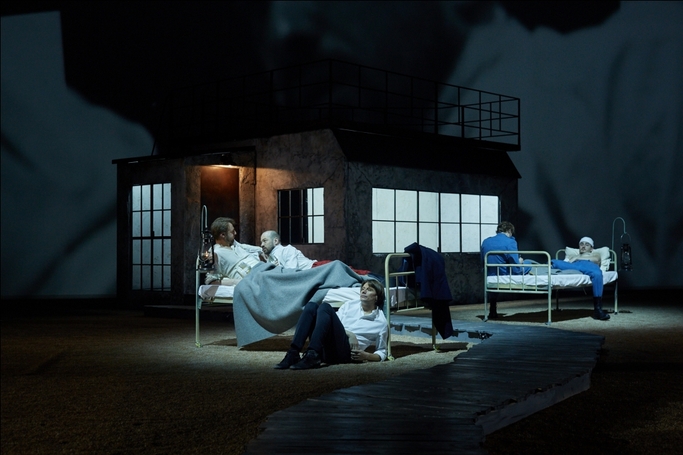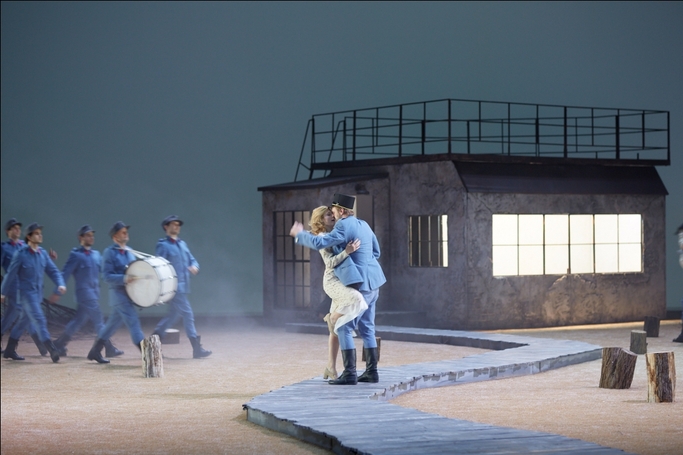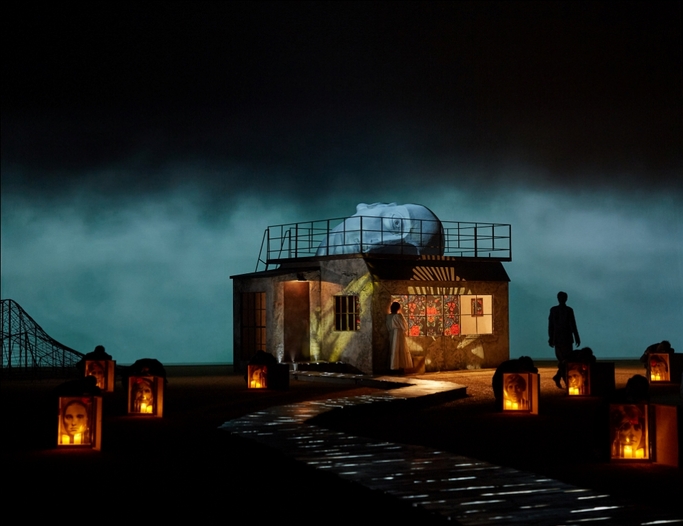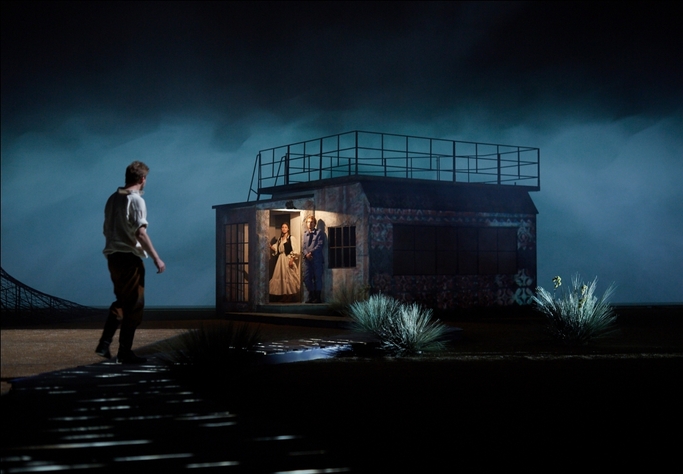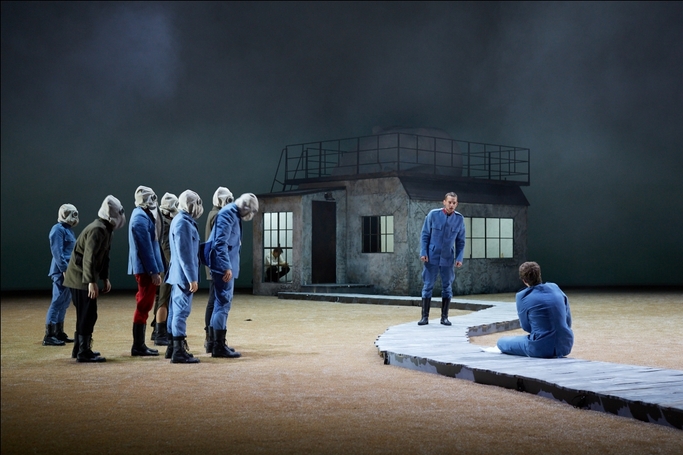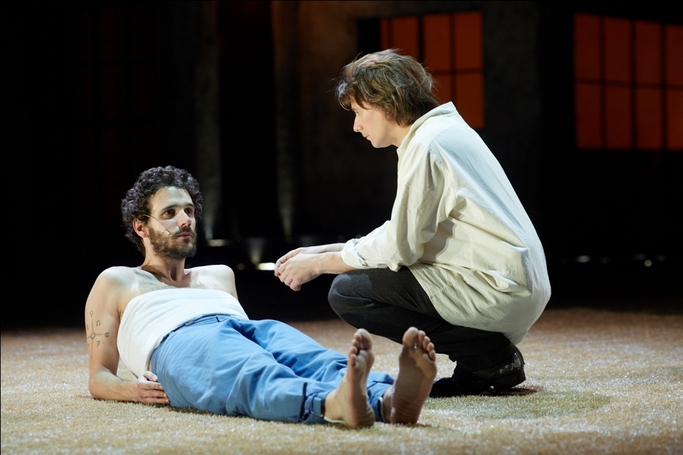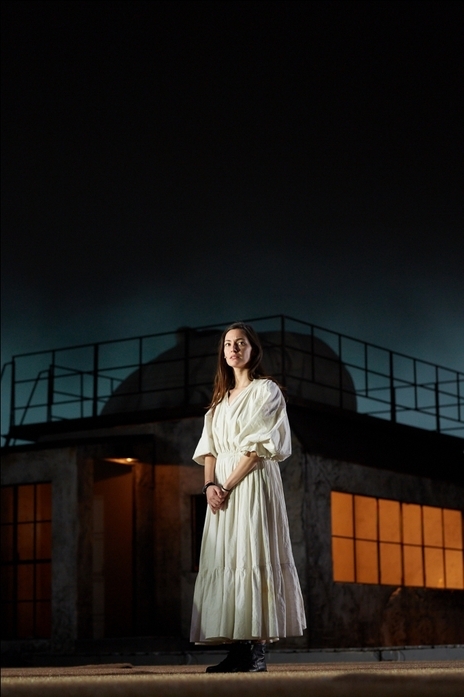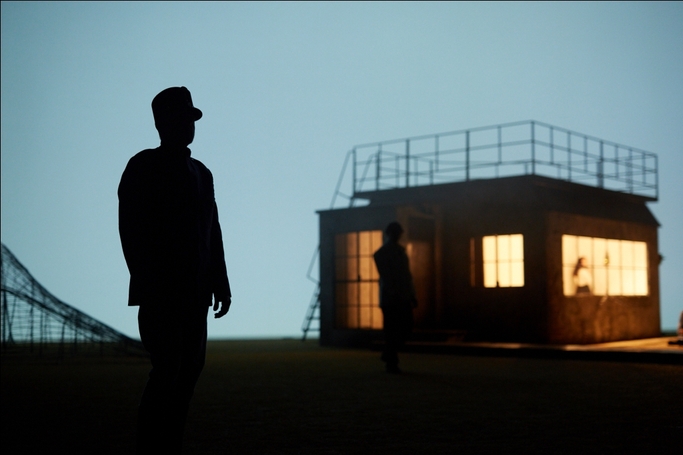Current Repertory
The Forest of the Hanged
by Liviu Rebreanu
The Forest of the Hanged
by Liviu Rebreanu
Premiere: 16.12.2018
Duration: 3 h 10 min / Pause: 15 min
80 lei
60 lei
30 lei (cu reducere pentru elevi, studenți și pensionari)
Show not recommended for minors under the age of 14: scenes that can affect them emotionally, nudity, scenes with sexual connotation, with a duration that exceeds their ability to pay attention.
Due to stroboscopic and light effects, of short duration and intensity, the show is not recommended for people with photosensitivity and those who suffer from epilepsy!
Radu Afrim's show after The Forest of the Hanged by Liviu Rebreanu, uncovers a tremendous poetry of a powerful and modern text and aims at addressing first of all young people of nowadays. Reinterpreting in his own key a major work of Romanian literature, the director transposes it into his imaginative universe, so specific, he uncovers new meanings, starting from the premise that Rebreanu's novel is not a war novel, but a psychological one.
„I do not wish to enact Rebreanu's book, I want to question a little what happened to us in these one hundred years and where we are ... It might be ambitious, risky, kitsch, wrong, but I wish to face those soldiers who fought for something then, although many did not know what they were fighting for, with young people of nowadays, with dialogues and questions, such as What did you do in 100 years, who were we at your age, what have we done…" explained Radu Afrim in a recent encounter with the press.
Far from any form of nationalism, the show provokes a lucid reflection on the state of the nation, a clear confrontation with our historical past, a dialogue between the voice of the present and the voice of history. A deaf, whispered or blunt, insinuating or reverberating voice through which the events of a world torn by massacres spell their true name in time, a voice that bears the specific tonality and ring of director Radu Afrim.
Using the entire surface of the huge stage of the Grand Hall, stage designer Cosmin Florea and his team create an acting space of a rare spectacularity, in tune with the directorial vision. And the troubling question, under which the dramatic events in the show unfold, is one that, defying festivisms, entails a more profound reflection: How do we relate, the ones nowadays, to our countrymen 100 years ago !??
Reflection addressing an audience of all ages.
Translated by Simona Nichiteanu
Photo by Adi Bulboaca
| Apostol Bologa: | Alexandru Potocean | Conscience: | Marius Manole |
| Klapka: | Richard Bovnoczki | Petre: | Ciprian Nicula |
| Ilona: | Raluca Aprodu | Lieutenant Varga, General Karg: | Istvan Teglas |
| Paul Vidor: | Vitalie Bichir | Ms Bologa: | Natalia Călin |
| Marta, Peasant woman: | Ada Galeș | Boteanu Priest, Musician: | Florin Călbăjos |
| Priestess, Nurse: | Alexandra Sălceanu | Corporal, Musician: | Emilian Mârnea |
| Cervenco: | Liviu Popa | Gross Colonel: | Silviu Mircescu |
| Soldier: |
Alexandru Chindriș Vlad Galer Cosmin Ilie Ciprian Valea |
Svoboda, Soldier: | Octavian Voina |
| A Military Doctor, Soldier: | Andrei Atabay | Peasant woman, Soldier: | Flavia Giurgiu |
| Vasile, Soldier: | George Olar | Teenager, Soldier: | Tiberiu Enache |
| Officer: | Bogdan Iacob | Soldier - Poet: | Vlad Ionuț Popescu |
| Performers: | Lenuța și Teodora Purja |
"Oh, no, there will be no show about how ignorant the heroes of the instant are compared to the greatness of the forerunners. This populist – boorish style of clumsily glorifying passed eras & creche symbols has never been Afrim’s style. No little tear shall thread on that stage which had known, at some point, shameful moments. Afrim prefers poppies.
Apropos that scene. "He got me from hello!" a friend confessed to me, with some tears in his eyes. Hello means, in the case of the Forest, the stage. In his best year (so far) of his best creative period (so far), Radu Afrim has achieved, together with the formidable Cosmin Florea (scenographer, former apprentice of Iuliana Vilsan), with Andrei Cozlac (video projections & special effects), with Andrea Gavriliu (stage movement & war dance & erotic choreography) and with Marius Manole (live camera; yes, it is no mistake!), one of the most beautiful acting spaces that you can admire in these years.
Apostol Bologa by Alex Potocean is perhaps the most non – Afrimian of the artist’s recent characters (apropos, do you know any Romanian artist above Afrimin this particular moment, December 2018?). His individuality is so poignant, that the show seems a personality cult of this man stifled by dilemmas, crushed by indecision, consumed by impossible choices.
Through his equal, dry, exterior performance, refusing any excesses, Potocean brings to 2018 the interwar intellectual, whose gestures and monologues could have been haunted by outdatedness. A light nuancing might be desirable in such moments, for a better highlighting of the transformations undergone by the troubled soul of his character. However, beyond this superficial remark, Potocean’s performance is outstanding. Very outstanding".
Mihai Brezeanu, Liternet – The Most Beloved of the Afrimians – The Forest of the Hanged
"Radu Afrim has that rare sort of bitter patriotism, which he uses with intelligence, in order to create a monolithic show about Romanian conscience.
Departing from a well-carved script, a rigorous and well-structured adaptation of the novel, the show’s structure is like a perfectly coloured sand mandala, drawn by Buddhist monks. The stage design, the light design, the choreography, the video mapping, the sound universe, each and every creative element is filled with details and has its poetry in this perfectly balanced kinetic tableau. Visually, „The Forest of the Hanged” features spectacularity and consistency.
In this fascinating and impressive visual essay, actors become an integral part of the moving landscape, composed with a steady and precise hand.
Radu Afrim turned „The Forest of the Hanged”, Rebreanu’s novel quoted by everyone, but read by very few, a show grabbing one by the collar and facing one with a Venetian mirror from a one-hundred-year-old mansion. And behold, youcan see yourself with your declared and declaimed patriotism and you are getting scared. You get scared of how lonely you have gotten while you were keeping your gaze onto your mini-screen and how evil the world around you has remained. It is a gesture of unfeigned patriotism, previously performed by gentlemen such as Caragiale, Ionesco or Pintilie".
Alina Epingeac, Yorick – When Soldiers Turn into Dogs in „The Forest of the Hanged”
"The Forest of the Hanged shall always remain a landmark in the history of Romanian theatre.
... for me, the scene with the soldiers’ suitcases bearing inside the faces of the martyrs who belonged to the mountain resistance movement from the first years after the Second World War, with those candles lighting up the faces and casting shadows over the space around them is the scene with the biggest visual impact of the entire show. If you leave the Forest of the Hanged only with this image on your mind and Radu Afrim’s artistic endeavour has still succeeded! Because yes, true history is not written in the history manuals, but in the wounds of the bodies torn by the steamroller of the long and unjust sequence of historical facts which threw Romania into the pit of a communism, exterminating human values.
There are many things to say / write about The Forest of the Hanged and I am certain that, from this point of view, the reviews of the show shall be very different. (...) I would also mention ... the bottles with poppies marking the way back home of Bologa. A winding path, the same as the path of Romanian history. An image with so much message in it, that I would wish to keep it in your thoughts until the moment you shall enter the hall. It is the path home taken by Radu Afrim, to his family. The path carved by history through the memory of an entire people and from which one can digress, one can go astray, but to which one can also return".
Nona Rapotan, BookHub – The Road Home Passes through the Forest of the Hanged
"Ravishing.
Thus looks the forest of the hanged by Radu Afrim.
The hero we need today, the one who does not wish to fight against his own country, calm and precise in his military duties, dignified in the encounters with the superiors, firm in the scene where he destroys a reflector of the enemies, sometimes choleric (especially in the fit he gets when he finds out that he must pass onto the Romanian front), frail in the ones where he falls in love with Ilona and infinitely warm in the ones where he talks to his mother, through letters or by word of mouth, Bologa is always torn inside between duty and honour, he is filled with regret and remorse, being crushed in the end by the absurdity of the war into which he has been thrown.
From a universe dominated by a hundred percent Afrimian war, where death is lurking insidiously (either with clenched teeth or with humour) from every corner of the stage, we witness the agony of the Austrian-Hungarian Empire and the hopes for peace and autonomy of a nation, from which the destinies of people are detached, who did not wish to be heroes, with their fears, dramas and loves, which stir every cell.
How much does the murder burdening our souls weigh? And who cares about our souls anyway? If we do not wish to die now? If we want to live?
„Where are we going?…”
I do not know, Radu Afrim. I have cried. I am still crying.
Thanks for asking".
Luciana Antofi, Blog – The Country of Illegal Wood and Conscience Clearance: The Forest of the Hanged by Radu Afrim
"What is impressive in Afrim’s show is not only the fact that he generates emotion in deeds, words and thoughts which sounded either nationalistic propagandistic, or outdated, but also and especially, that he projects towards us, in contemporaneity, the subjects and characters without ostentation, organically, necessarily, His style, his way of thinking theatrically bring him back towards a synthesis where symbols and abstraction enhance his ideas and support the debate engaged by the author. (...)
Manole’s conclusive presence allows Bologa, impersonated with great attachment and conviction by Alexandru Potocean over the entire range of his states, to live his dilemmas on view, to involve us in his turmoils, thus somehow soothing his cumbersome drama.
(...) a philosophical, polyphonic poem, with a troubling message about destiny, motherland and history, faced with which – according to Bologa – the heart and mind no longer seem to go together. What is impressive in Afrim’s show is not only the fact that it generates emotion in deeds, words and thoughts which sounded either nationalistic propagandistic, or outdated, but especially, that he projects towards us, in contemporaneity, the subject and characters without ostentation, organically, necessarily. His style, his manner of thinking about theatre are leading him then towards a synthesis where symbols and abstraction enhance the ideas and support the debate engaged by the author".
Doina Papp, 22 Magazine – A Symbolic Forest in a Poem-Show by Radu Afrim
"Marius Manole and Alexandru Potocean achieve an almost unreal exercise of complementarity, a hallucinating suspension between Now and Then. In their utterance, their retorts have o hallucinating suspension between Now and Then. In their utterance, the retorts have something of the residual force of benign subliminal messages, opening like portholes, towards a bleak, muddy, captive Yesterday and exploding into a misshapen, crazed, impersonal Today.
This is the kind of show which is taken on its own and settled individually. It is powerful, original, assumed and requires responsible spectators, with a receptive fibre, with thirst for a message charged with meaning.
„The Forest of the Hanged” is not only Friday night theatre, which we attend because there is nothing on TV, we go to laugh and because we like Manole. It is a culturally endoscopic endeavour, invasive as any seriously approached project".
Razvana Nita, Blog Acta est fabula – My Brother is Under the Rope
"... only The Forest of the Hanged constitutes the major event, necessary and painful, of the much sung Centennial (if we were to reflect honestly upon substantive issues, of truly national interest). The displacement achieved by Afrim between truly major moments, truly heroic and the ensuing reverberations, generate from then on a formidable revelation: it is not that we have lost, as a nation, everything we had gained thus far, in 1916-18, but the century of wasteland which elapsed in the meantime has brought Romania to the stage of a former forest, strongly deforested, up to destruction by the descendants of the ones whom it had defeated 100 years ago.
(...) dense, touching show, where each retort or scene amazes, raises questions and is food for thought, alert...
(...) cultural event, truly national, representing a scream of revolt and despair, an appeal to lucid memory, to dignity and authentic patriotism. (...) Event uniting, admirably, the highly aesthetic and the militant dimension".
Bogdan Burileanu, Liternet – The Forest of the Gorgons. The Endless Nightmare... – Forest of the Hanged
"The Forest of the Hanged – the show, not the novel – has young people who have not read the book for the graduation exam, has parents who left to Italy, has Rebreanu’s story with the sacrifice out of faith and duty towards oneself, above the requirements of an authority, it has dance (with a powerful and touching choreography – conceived by Andreea Gavriliu – with dancing actors, for real) and much humour.
It contains Manole who vibrates on the stage and Potocean who achieves one of his most refined – intellectual performances. (...) It contains very touching sequences (...) He also has the profound understanding of Rebreanu’s philosophy (who has written the novel as a tribute to his brother killed in war, when he tried to join the Romanian army) and of the area he inhabited, because both Afrim and Rebreanu are born near Bistrita, in neighbouring villages".
Cristina Bazavan, Simpa Bazavan.ro - #tosee The Forest of the Hanged at TNTB – another challenge of Radu Afrim
"Realism and poetry are the two lungs, whereby Afrim’s „new forest” breathes; an ample respiration which fills aesthetically and urges with refined discretion to the decantation of essential things. He succeeds this difficult bet, introducing on the stage an enigmatic character, Conscience. Performed by Marius Manole, „the critical dopplegänger” of Apostol Bologa crosses a generous spectrum of nuances, accumulates many questions in the attempt of giving a personal meaning to good and evil which, far from remaining abstract ideas, configure themselves as relationships, as connections among . Marius Manole renders Bologa’s inner metamorphoses visible, accompanying justly and with finesse the passages from one state to another, other times preparing the soul’s leaps into the void. The voices of the two chase one another as in a Fugue, turning Bologa’s monologue into an expressive journey into the labyrinth".
Andreea Nanu, Metropolis Newspaper – Bologa, Apostol
"When Teodora Purja intones a sad Transylvanian doina about the forest on the great stage of the National Theatre of Bucharest, accompanied by the sound of revved chainsaws, one gets the chills! It is an aesthetic „announcement“ about one hundred years ago and nowadays, installing the beholders in the assumption of directorial construction and laying out a comprising horizon of expectations for Radu Afrim’s Forest of the Hanged.
Afrim has worked impeccably with the actors, both as individualities, and as a support".
Oltita Cintec, Suplimentul de Cultura – The Forest of the Hanged, a Show Devouring Itself
"Theatrically speaking, I state from the very beginning that this Forest of the Hanged seems to me at the same time a show rife with depths, challenging from an aesthetic and thematic point of view, and one whose options of pushing the audience’s contemporary „buttons“ do not prove to be, in the end, necessarily organic and/or integrated into the central proposal.
Iulia Popovici, Observator Cultural – Some Aspects of a Forest of the Hanged
"The Forest of the Hanged is a demythologizing essay about national identity, capable of counterbalancing the festive spirit which marked the Centennial last year, being at the same time, the sole monumental and viable show on this topic".
Oana Stoica, Dilema Veche – Nothing New on the Eastern Front
"The modernity and poetry of a writing support the structure of a troubling poem-show, modern, vast, filled with elaborate details, with patience, dedication and passion, costing one through creation, performance, contemplation, challenging one to research in an involved manner time and space, the one hundred years, which move one’s mind and soul and make the soul vibrate, cleaning the dust of prejudices, sufficiency, ignorance even. (...)
The moral axis of the show is a dimension which touched me profoundly. It seems to me a major stake which doubles perfectly all the tissues of this creation of my time, a strong, European creation, with a tension haunting me".
Marina Constantinescu, Romania Literara no.2/2019 – What Darkness Descended upon Earth
"The Forest of the Hanged, directed by Radu Afrim, at NTB, not only renders Liviu Rebreanu's text topical and not only makes use of the newest aesthetic means of contemporary theatre, but also establishes the link to the Romanian political situation, to the European one in its entirety, perhaps even worldwide, launching a question valid for the entire world nowadays: ”Where / Whereto are we heading?”.
The show is not only one of perspective, but also of detail. Out of the need of rendering details and for them to be able to be captured by the spectators (interior details, the wall carpet, the painting of Adam and Eve etc., but also details pertaining to mimic, gestures and the characters' corporality), Radu Afrim introduces in a justified manner the real-time projection. Details contribute to the quality of confession-show. The show is beyond doubt a confession, not only about the past, but also about the present. It is Radu Afrim's most social show, without being documentary. The success in this respect is largely due to the casting of Alexandru Potocean in the role of Apostol Bologa, an actor with a tremendous experience in documentary and socio-political theatre, holding at the same time the force of creating a strong character, from a human, moral and psychological point of view".
Dana Tabrea, Ziarul de Iasi - Where to Are We Heading?
"... a show like Radu Afrim's "Forest of the Hanged" cannot but ignite endless talks and writings, because of the innumerable symbols, beauties and meanings it encompasses. I hope, as the director wanted, the National Theatre show to determine young people to revert to Rebreanu's book and also face them with history, raising a question that echoes now: after 100 years, where have we arrived and "Where do we go?" For now I realize that the question "Who is Apostol Bologa" must be "Apostol Bologa are we” and True consciousness shall have to overcome empty patriotic phrases and awaken us to reality. Thank you, Radu Afrim! "
Tudor Sicomas, Radio Theatre Magazine - Who is Apostol Bologa
''Finally, at the moment of collective grace of this national requiem, The Forest of the Hanged, magic and history, signed by Radu Afrim. Rebreanu's novel, which some young people discover in the centenary year with astonishment and learn to read, especially through this show, their own national history with today's eyes, a past that comes back against our will. Afrim did not contemporize the story of Lieutenant Apostol Bologa, who, enrolled in the Austrian imperial army, prefers to defect and chooses death in order not to fight against his own nation. And here the question will return to the show in other forms, with images from nowadays. In fact, the story of the Forest of the Hanged remains a document-show like an insect caught in the amber of time. Some alarm signals, from the lifting of the curtain, the chainsaws that sound threatening while on the stage a few unwavering men stand on one leg bent on the trunks of fallen trees. Yesterday and today they are always intertwined. It is not possible for us to fight against ourselves, Bologa exclaims, while on the big screen in the background you can see pictures from the protests of August 10th, 2018 in Victoria Square. Or the extraordinary, heartbreaking ending. ''
Mirella Patureau, Dilema Veche - Some Magical Theatre Moments - NTF 2019
'' ... do not go to the Forest of the Hanged, if you are too lazy to read the book. This is not a movie or an enactment, for educational purposes. Go on, though, if you want to see that today's world, glued to smart screens, is no longer smart at all. In the face of daily violence, from the hanging of a dog, in front of the block, to the repressions of August 10th, Romania has no more heroes. Or it doesn't know it has them, because everyone is online. ''
Florian-Rares Tileaga, Liternet - A Show for Online Heroes - The Forest of the Hanged at NTF, 2019
"It is amazing the sobriety and the depth whereby Afrim, once the enfant terrible of the theatre world, leaned over a novel so dense and difficult to dramatize."
Vasile Andreica, Daily Information - A scenic monument and a meditation on moral patriotism
"The Forest of the Hanged" by Radu Afrim is a triumph of the Romanian theatre and of the Romanian culture, which produced a historic show on the occasion of the Centenary.
Horia Ghibutiu, Days and Nights - The Forest of the Hanged at NTB
Translated by Simona Nichiteanu
The Radio Romania Cultural Award for Radu Afrim (The Forest of the Hanged) within the Radio Romania Cultural Awards Gala, 2019.


